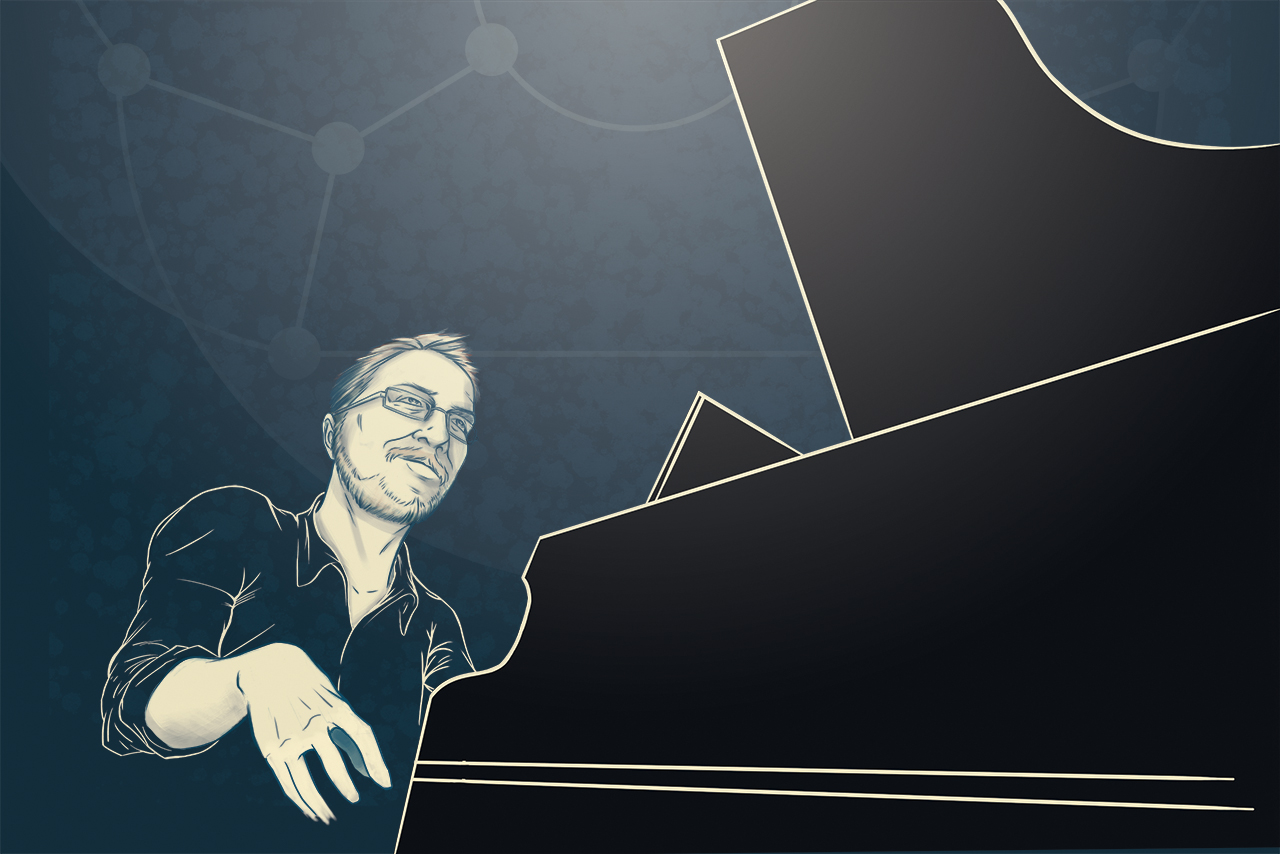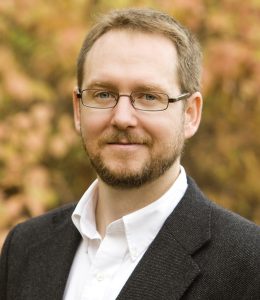There is an unmistakable brightness to Carl Schimmel’s music. He infuses his compositions with subtle humor, even his more serious pieces. He is trying to tap into sentiments that are relatable to most everyone.
Despite that seemingly lighthearted approach, his work as a composer is taken quite seriously. The ultimate proof of that came last spring when he was named a 2018 Guggenheim Fellow for his work in music composition.
Appears In“I’ve tried to apply the aspect of emotional expression in my music, the very basic emotions that humans have,” Schimmel said. “I think that one thing that I explore in my music that’s a little different is absurdity, humor, and being very silly.”
His Guggenheim application laid out his exploration of narrative in music through human emotion. “I can construct a musical composition that uses the basic components of the fairy tale as a template that almost functions as a narrative,” he said.
Schimmel is an associate professor of music theory and composition in Illinois State University’s School of Music. Like many before him, he had applied for the Guggenheim several times. So what made the difference this time?
“When you’ve composed long enough, you develop a style and hope that people take notice,” he said.
Schimmel has also received the Columbia University Joseph Bearns Prize, the Lee Ettelson Award, and the 2017 Goddard Lieberson Fellowship from the American Academy of Arts and Letters—all among the most prominent awards for composers. In addition, his work has been performed at Carnegie Hall and throughout North America, Europe, Australia, and Asia.
“It’s a great honor to be awarded a Guggenheim Fellowship,” said Stephen Parsons, director of Illinois State’s School of Music. “It brings prestige to him, to the School of Music, and to the College of Fine Arts. He’s a highly regarded teacher and colleague. The students really appreciate his knowledge and expertise.”
Parsons noted that Schimmel’s music is extremely well crafted, catching the attention of many professional ensembles across the country.
“It’s a great honor to be awarded a Guggenheim Fellowship. He’s a highly regarded teacher and colleague. The students really appreciate his knowledge and expertise.”—Stephen Parsons
“His music is widely performed, which I’m sure weighed in the decision of the Guggenheim people,” Parsons said.
Music is Schimmel’s life’s work, but math and the art of storytelling have been there all along. In fact, at Case Western Reserve University in Cleveland, he earned bachelor’s degrees in math and music. From there, it was on to Yale University and eventually to New York City in 1999, where he worked for about three years as an actuarial assistant.
Schimmel was born in Pensacola, Florida, but grew up in Wakefield, Rhode Island. His family needed to live near the water because his father was a marine biologist for the Environmental Protection Agency.
His parents, Steven and Theresa, were supportive and knew that he had a talent for the creative arts. They paid for piano lessons, but like most parents, they were pragmatic and wanted him to be able to make a living. Studying math seemed like a pretty good idea to them. “But, that’s not why I got a math degree,” Schimmel said. “I got the math degree because I loved math.”
Creativity was part of Schimmel’s life from an early age. He wrote poems and stories as a child. He took up the piano at age 10, and by 11 was composing music. He continued composing during junior high and high school. When he was a senior, his parents found a University of Rhode Island composition professor to tutor him.
“As a kid I was learning about classical music and composers,” Schimmel said. “My parents got me a set of cassette tapes of the classical composers.”
As a composer, Schimmel melds his early love for music, math, and storytelling.
“I’ve used math in my music, specifically a concept called set theory, in terms of structure of the piece, the proportion of the piece,” Schimmel said. “It’s using a collection of pitches or notes that have a numerical relationship and then applying them throughout the piece.”
Pattern, he pointed out, is an important element to music that has a mathematical component. The importance of structural relationships can be seen in a math equation and in a piece of music.
“That’s a quantitative thing that can be measured,” he said. “It’s often seen that there is a connection between math and music, but it’s not always there.”
As for career path, there was never any real mystery, at least to him, what direction he would take. “I always intended to go on for a doctorate in music, but I thought it was a good idea to take some time away from academia,” he said. “Plus, I wanted to experience living in New York City.”
In the classroom, Schimmel now teaches graduate and undergraduate students, in addition to giving private lessons in composing. To keep things interesting to his students, he includes live music when possible. And, he offers extra credit to students who will perform music in class. “What I enjoy most about teaching theory is introducing the music I love to students, how it’s constructed, the effect it has, and its musical structure.”
Schimmel was influenced by his own professors as a student. At Yale, composer Martin Bresnick was a mentor. At Duke University—where Schimmel earned his Ph.D.—Steve Jaffe and Sydney Hodkinson have both been lasting influences on him.
Since he arrived at Illinois State in 2009, Schimmel has kept two households. He met his wife, Mariko, at Yale while he was at work on his master’s degree and she was pursuing her doctorate. She now teaches Japanese at Grinnell College in central Iowa, and lives there with the couple’s 8-year-old twins, Otto and Thora.
He found out that he had won a Guggenheim while traveling in California.
“It was kind of exciting—I was in California for a concert in San Francisco, and I stopped to check an email that was strongly suggesting that I was getting a Guggenheim,” Schimmel said. “They like to keep things quiet, so I had to call New York City to try to clarify what was going on.”
Once he had confirmed the good news, he got back on the phone to call home. The prestige of the Guggenheim is certainly significant, but also top of mind for Schimmel and his family is that it allows them to be together in their Iowa home for an extended period.
“In our case it was important because normally I’d be apart from the family,” Schimmel said. “But with the Guggenheim, I’d be with the family for another year.”
Of the 173 fellows chosen in 2018, Schimmel was one of a dozen honored for music composition. The Guggenheim provides a monetary award and a yearlong fellowship, whose purpose is to “add to the educational, literary, artistic, and scientific power” of the country.
Schimmel will take the opportunity to make use of his workspace in his home, which consists mainly of a piano in the family’s living room. His first big project is composing a piece for the Illinois Symphony Orchestra that will premiere in the spring. He is also working on a series of piano pieces for pianists he knows, and he is composing a string quartet for New York-based Momenta Quartet.
Adriana Ransom, associate professor of cello at Illinois State, said Schimmel is a rising young composer who is known for his ability to compose a narrative.
“I think he’s an excellent storyteller,” Ransom said. “The new cello concerto that I premiered last year was contemporary music—but it was melodic at its heart, and it was structured in a way that made the music easy to follow for the listener.”
She appreciates that while Schimmel’s primary instrument is the piano, he also studied violin and has a knowledge of stringed instruments.
“He’s very versatile,” Ransom said. “He is capable of writing for many different instruments and different combinations of instruments—sax quartet, orchestral pieces, solo cello, etc.”
His parents are very proud. Once hesitant about their son’s artistic bent, they contacted their small hometown newspaper about the Guggenheim, which resulted in him being interviewed for a story.
His life and art have brought him all the way around like the circumference of a circle, to reference the simple shape so elementary to the study of math, the subject he has loved since childhood.
“The work draws upon my early interest in writing and telling stories,” Schimmel said. “In a way, I’m back to when I was 6, 7, or 8, back to when I was writing stories. I’m kind of returning to my artistic roots.”
To listen to more of Carl Schimmel’s compositions and for a list of his recordings, visit his website.
John Moody can be reached at jemoody2@IllinoisState.edu.


